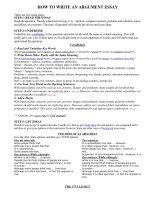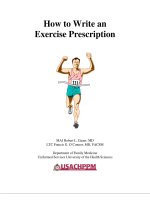how to write an ielts task 2
Bạn đang xem bản rút gọn của tài liệu. Xem và tải ngay bản đầy đủ của tài liệu tại đây (276.86 KB, 5 trang )
www.ieltsbuddy.com - Free online IELTS Advice
How to Write an IELTS Essay
On this page you will find some guidance on how you should write an IELTS essay.
This is just one essay, so it is important to analyse model answers for other IELTS essays
because there are different essay types, and these will require different ways to answer them.
However, as you will see from the guidance on this page, they can all follow the same basic
structure.
How do I Write an IELTS Essay?
In order to answer this, lets first look at a sample question:
You should spend about 40 minutes on this task.
Present a written argument to an educated reader with no specialist
knowledge of the following topic.
In the last 20 years there have been significant developments in
the field of information technology (IT), for example the World
Wide Web and communication by email. However, future
developments in IT are likely to have more negative effects than
positive.
To what extent do you agree with this view?
Give reasons for your answer and include any relevant examples from your
own experience or knowledge.
You should write at least 250 words.
www.ieltsbuddy.com - Free online IELTS Advice
www.ieltsbuddy.com - Free online IELTS Advice
An IELTS essay is structured like any other essay; you just need to make it shorter. There are
three key elements:
1. Introduction
2. Body Paragraphs
3. Conclusion
We will look at each of these in turn, using the essay question above as an example.
1) Introduction
You should keep your introduction for the IELTS essay short. Remember you only have 40
minutes to write the essay, and some of this time needs to be spent planning. Therefore, you need
to be able to write your introduction fairly quickly so you can start writing your body paragraphs.
You should do just two things:
State the topic of the essay, using some basic facts (that you may be able to take from the
question)
Say what you are going to write about
Here is an example introduction for the above essay question about IT:
The last two decades have seen enormous changes in the way people's lives are affected
by IT, with many advances in this field. However, while these technological advances
have brought many benefits to the world, it can be argued that future IT developments
will produce more negative effects than positive ones.
As you can see, the first sentence makes sure it refers to the topic (IT) and uses facts about IT
taken from the question. Note that these are paraphrased - you must not copy from the rubric!
The second part then clearly sets out the what the essay will be about and confirms the writers
opinion (some questions may not ask for your opinion, but this one does).
www.ieltsbuddy.com - Free online IELTS Advice
www.ieltsbuddy.com - Free online IELTS Advice
2) Body Paragraphs
For an IELTS essay, you should have 2 or 3 body paragraphs - no more, and no less.
For your body paragraph, each paragraph should contain one controlling idea, followed by
supporting sentences.
Lets look at the first paragraph for the essay about IT. The essay is about the benefits and
drawbacks of IT, so these will need to be discussed in separate paragraphs.
Here is the first body paragraph:
To begin with, these developments have brought many benefits to our lives. Email has
made communication, especially abroad, much simpler and faster, resulting in numerous
benefits for education, commerce and business. Furthermore, the World Wide Web means
that information on every conceivable subject is now available to us. It is evident that this
has made life far easier and more convenient for large numbers of people.
The first sentence in bold (the topic sentence) tells us what the paragraph is about, and there are
two supporting ideas, which are underlined.
Most of the essay will focus on the negative aspects of IT, as the writer says there are more
negative effects in the introduction. So the next two paragraphs are about these.
The topic sentence in the next paragraph therefore tells us we are changing the focus to the
negative points:
Nevertheless, the effects of this new technology have not all been beneficial. For
example, many people feel that the widespread use of email is destroying traditional
forms of communication such as letter writing, telephone and face-to-face conversation.
Furthermore, with the ever increasing use of information technology these negative
elements are likely to increase in the future.
The final body paragraph gives the last negative effect:
In addition, the large size of the Web has meant that it is nearly impossible to regulate
and control. This has led to many concerns regarding children accessing unsuitable
websites and viruses. Unfortunately, this kind of problem might even get worse in the
future at least until more regulated systems are set up.
www.ieltsbuddy.com - Free online IELTS Advice
www.ieltsbuddy.com - Free online IELTS Advice
3) Conclusion
The conclusion only needs to be one or two sentences, and you can do the following:
Re-state what the essay is about (re-write the last sentence of your introduction in
different words)
Give some thoughts about the future
Here is an example:
In conclusion, developments in IT have brought many benefits, yet I believe developments
relating to new technology in the future are likely to produce many negative effects that
will need to be addressed very carefully.
The full IELTS Essay:
The last two decades have seen enormous changes in the way people's lives are affected by IT,
with many advances in this field. However, while these technological advances have brought
many benefits to the world, it can be argued that future IT developments will produce more
negative effects than positive ones.
To begin with, these developments have brought many benefits to our lives. Email has made
communication, especially abroad, much simpler and faster, resulting in numerous benefits for
education, commerce and business. Furthermore, the World Wide Web means that information
on every conceivable subject is now available to us. It is evident that this has made life far easier
and more convenient for large numbers of people.
Nevertheless, the effects of this new technology have not all been beneficial. For example, many
people feel that the widespread use of email is destroying traditional forms of communication
such as letter writing, telephone and face-to-face conversation. Furthermore, with the ever
increasing use of information technology these negative elements are likely to increase in the
future.
In addition, the large size of the Web has meant that it is nearly impossible to regulate and
control. This has led to many concerns regarding children accessing unsuitable websites and
viruses. Unfortunately, this kind of problem might even get worse in the future at least until more
regulated systems are set up.
In conclusion, developments in IT have brought many benefits, yet I believe developments
relating to new technology in the future are likely to produce many negative effects that will
need to be addressed very carefully.
(259 words)
www.ieltsbuddy.com - Free online IELTS Advice
www.ieltsbuddy.com - Free online IELTS Advice
Comments
The IELTS essay introduction talks in general about the increasing use of IT, thus introducing
the topic well. The thesis then clearly sets out the writers opinion.
The following paragraph mentions the present benefits of these developments, but the opening
sentence in the third paragraph is a qualifying statement (Nevertheless, not all the effects...), so
the writer can now focus on the negative elements.
The fourth paragraph provides two other negative examples (lack of regulation, viruses). Both
paragraphs suggest that these problems will continue in the future.
The essay concludes with a clear opinion that agrees with the statement.
Overall, it is a well-balanced text that mentions the present situation (...this has made life...) but
importantly, also refers to the future of IT (...likely to increase..., might get worse...).
www.ieltsbuddy.com - Free online IELTS Advice









